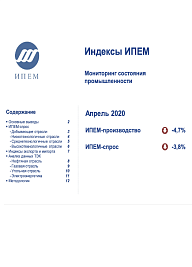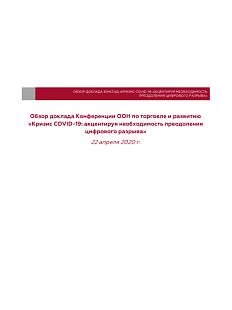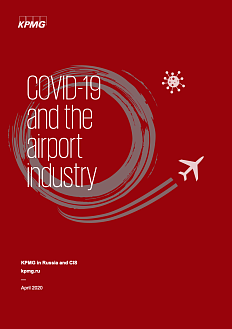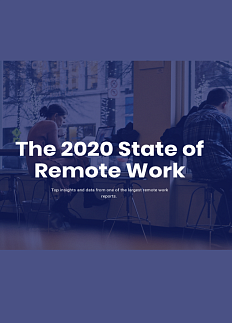In this publication, the Institute of Natural Monopolies Research (IPEM) summarizes the performance of Russias manufacturing industries in April 2020. This month, IPEM registered a sharp drop in manufacturing which is the greatest on record since the 2008-2010 financial crisis. Moreover, demand for Russian industrial products fell to the level of the 2014-2015 crisis. IPEM-production index and IPEM-demand index (indicators of the manufacturing industry development and of demand for industrial products) demonstrated a synchronous fall in April, with IPEM-production declining by 4.7% and IPEM-demand by 3.8%. Since the beginning of the year, IPEM-production index decreased by 1.6% compared to the same period of the previous year, and IPEM-demand decreased by 2.6%.
The Roscongress Foundation presents the salient points of the publication accompanied by fragments of broadcasts of relevant panel discussions from the business programme of international events held by the Roscongress Foundation.
Demand in extractive industries declined by 4.7% in April 2020 compared to April 2019.
Like a month earlier, the demand in extractive industries reached a record low, falling by 4.7% compared to April 2019 (-2.7% over four months).
Oil production increased by 1% compared to April 2019 (+0.8% over the period from January to April compared to the same period a year before). Exports declined by 0.3% (-1.8% since the beginning of the year). In mid-April, in light of the global drop in demand for oil, the OPEC+ countries concluded a new agreement about oil production cuts for a period of two years. Under this agreement, Russia must reduce its oil production by 23% between May and June 2020, by 18% between July and December 2020, and by 14% from January 2021 onwards (calculated from a baseline of 11 million barrels per day). Despite the agreement, average prices for Urals oil dropped to a new minimum in April. In mid-April negative prices were registered for the first time in history.
Gas production in Russia fell by 14.3% in April, while exports to non-CIS countries declined by 1.7% (-8% and −16.9% respectively over four months of 2020).
Coal production in April declined at a slightly lower rate than a month earlier (-8.3% to April 2019 and −7.9% since the beginning of the year). Coal exports in April continued to fall as well (-11.8% in April, −10.5% over four months) due to a reduction in global demand for coal caused by, among other things, a decline in energy consumption in Europe and Asia. Furthermore, the anticipated decrease in gas prices in oil-linked contracts can further weaken the competitiveness of coal in power generation against other fuels. Anti-epidemic measures act as a contributing factor in the reduction of exports. Cargo ships coming to coal terminals in the Russian Far East now have to spend two weeks in quarantine, which has an adverse effect on coal turnover.
Demand in low-tech industries continued to grow in April 2020.
Demand growth in low-tech industries which had been observed since July 2019 accelerated in April (+15.9% to April 2019, +9.5% since the beginning of the year). Due to colossal demand for food products and personal protection items, the industries producing these types of goods made the greatest contribution to this sectors development.
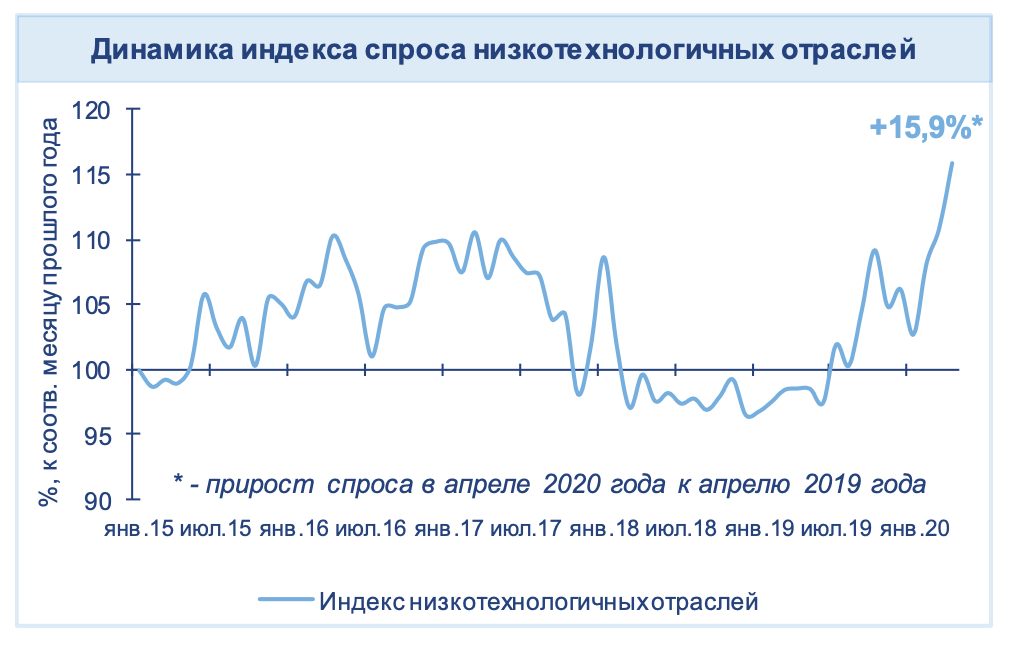
In April 2020, two large production facilities were launched:
· a wood processing plant was opened in Vologda Region (with total investments of RUB 0.55 billion);
· a packaging paper production line was launched in Rostov Region (RUB 0.5 billion).
In medium-tech industries, demand continues to decline for the twelfth month in a row.
Nearly all medium-tech industries see a decrease in demand for their products for the twelfth month in a row (-9.1% in April, −4.7% over four months of 2020). The deceleration in economic activity, above all in production centers both in Europe and Asia, resulted in a drop in external demand for both ferrous (-3.9% in April, −8.2% since the beginning of the year) and non-ferrous metals (-12.1%, −7.9%). Domestic demand is also shrinking for both ferrous (-20.0% in April, −9.1% since the beginning of the year) and non-ferrous metals (-19.3%, −15.9%). Notably, Russian exports of chemical and mineral fertilizers increased (+4.0% in April, −6.2% since the beginning of the year) because major Chinese suppliers of fertilizers were forced to stop operations due to anti-epidemic restrictions.
Demand in high-tech industries showed a sharp drop in April 2020.
In high-tech industries IPEM registered a sharp drop in demand (-29.5% to April 2019, −12.8% over four months). Loading volumes of machine building products on the rail network continued to decrease (-18.1% in April, −16.8% since the beginning of the year). While a steady decline in loading volumes is observed on the domestic market (-20.8%, −17.5%), exports unexpectedly showed an increase in April (+12.1%, −9.4%).
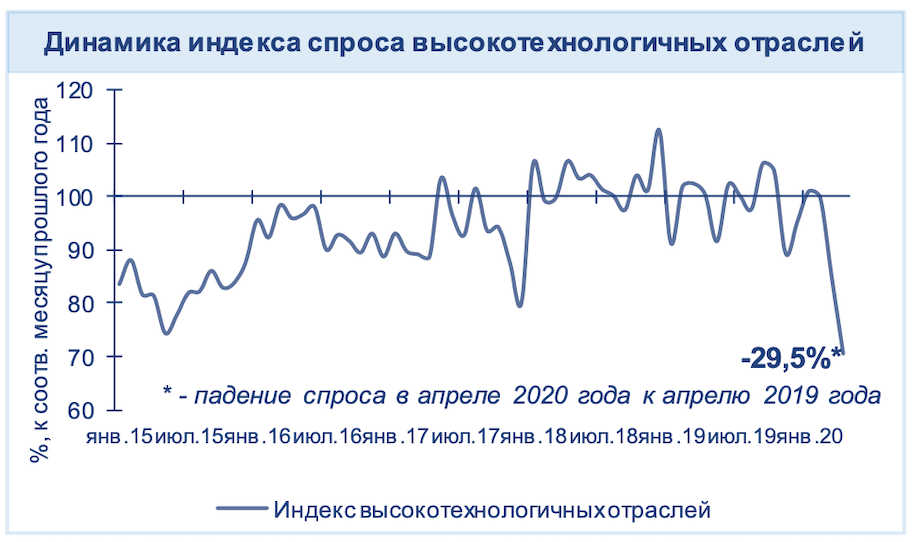
For more information about possible ways to stabilize the economy during the pandemic, please see the StayHomeEconomy special section of the Roscongress information and analytical system, and the Exploration and mining and Engineering sections about mineral extraction and machine building as drivers of the economy.


